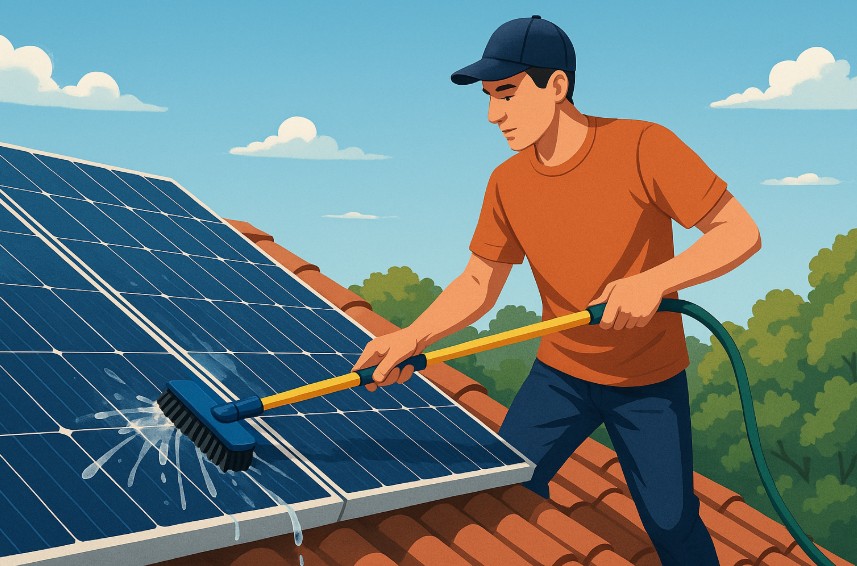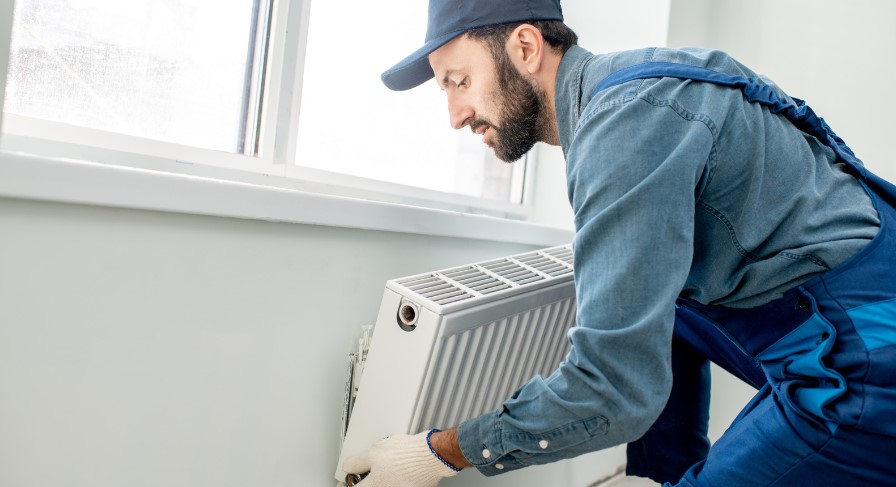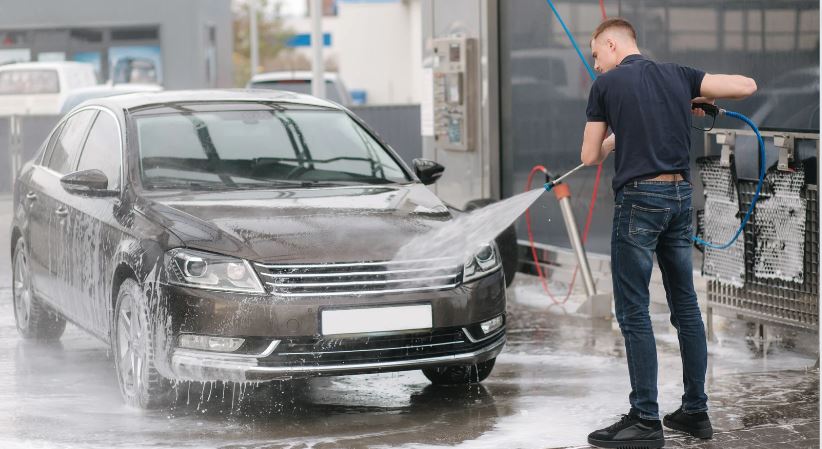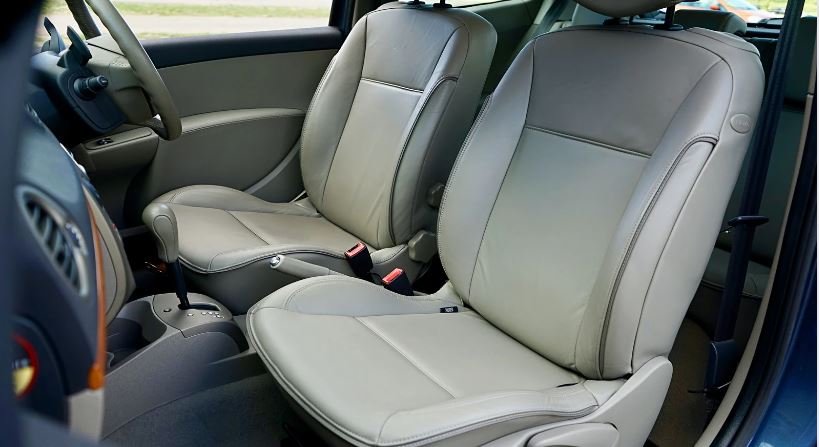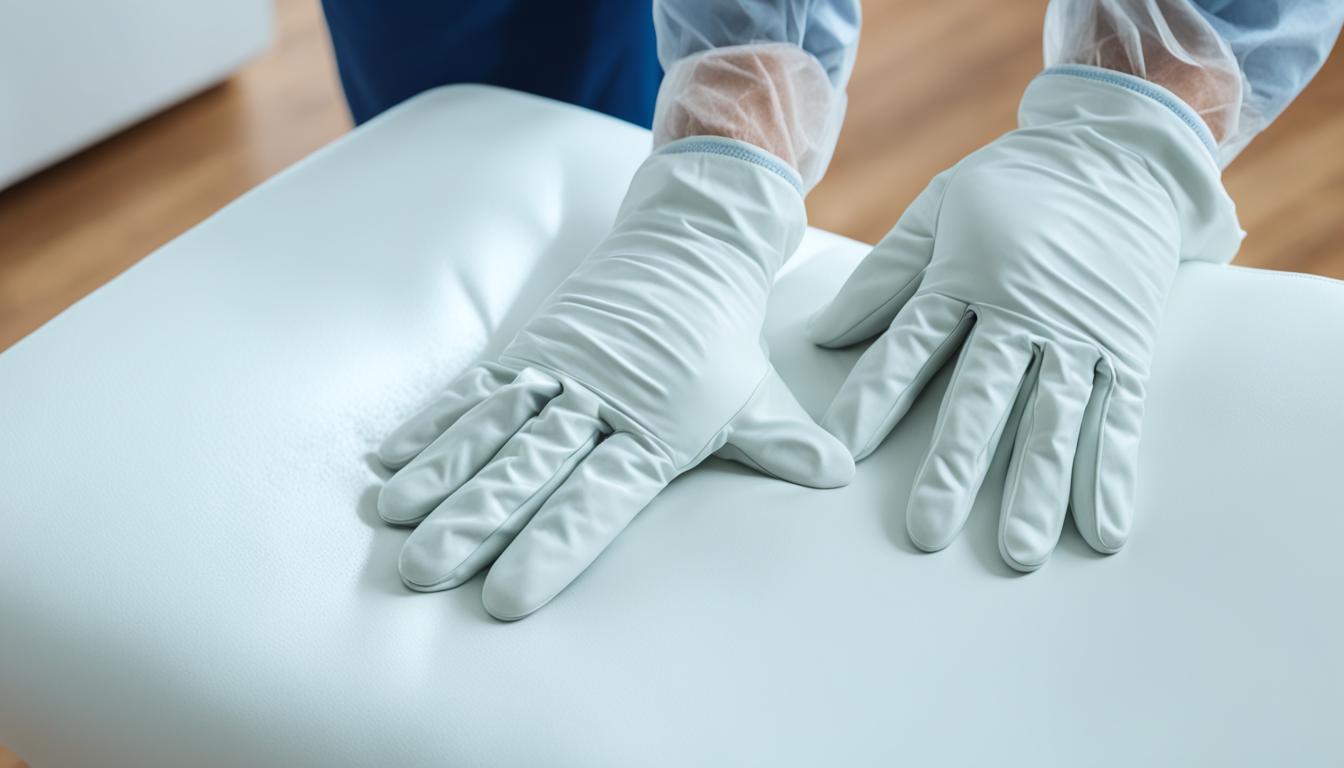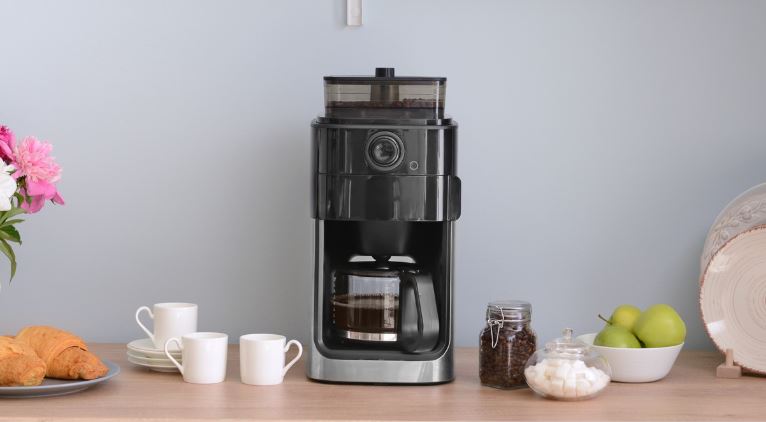Have you ever wondered whether your solar panels are as clean and efficient as they could be? Many homeowners install solar panels to reduce energy costs and support sustainability, but over time, dirt, dust, and bird droppings can affect their performance.
Cleaning them may seem daunting, especially when they’re hard to reach or located on a rooftop. However, with the right techniques, tools, and timing, maintaining your panels can be safe, simple, and cost-effective. Knowing how to clean solar panels properly not only improves energy output but also extends their life.
In this guide, you’ll discover step-by-step cleaning methods, when and how often to clean, common mistakes to avoid, and when it’s best to call in a professional.
Let’s explore everything you need to know to keep your solar panels performing at their peak, safely and efficiently.
Why Should You Clean Your Solar Panels?
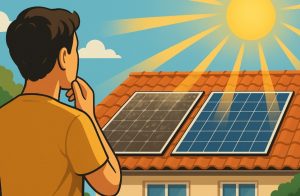
Keeping your solar panels clean is crucial to ensure their ongoing efficiency. Over time, panels accumulate dust, leaves, bird droppings, and other environmental debris that can block sunlight from reaching the photovoltaic cells. Even a small reduction in light exposure can lead to a noticeable drop in energy output.
Clean panels can absorb more sunlight, which means they generate more electricity for your home. This is especially important in the UK, where cloudy weather already limits solar generation at certain times of the year. If your panels are dirty, their performance can drop by as much as 20 percent depending on location and conditions.
Key benefits of cleaning solar panels include:
- Enhanced energy efficiency due to unobstructed sunlight
- Longer panel lifespan thanks to reduced wear from grime and residue
- Cost savings by maximising your return on solar investment
- Protection of warranties, which sometimes require evidence of maintenance
Neglecting this task may not damage the panels immediately, but it will gradually lower their efficiency. That means you’re paying more for electricity when your panels could be supplying more of it for free.
Regular cleaning is part of smart solar panel ownership and helps protect your investment in the long run.
When Is the Best Time to Clean Solar Panels?
Choosing the right time to clean your solar panels can make the process safer, easier and more effective. Timing is essential not only for results but also for your safety and to prevent potential damage to the panels.
Early morning or late evening is the ideal time. During these cooler hours, the panels are not hot from the sun, which reduces the risk of water quickly evaporating and leaving streaks or mineral residue. Cleaning in the middle of a hot day can also lead to sudden temperature changes, which may damage the panels’ surface.
Best times and seasonal advice:
- Spring: Clean after winter to remove accumulated grime
- Autumn: Clear away summer dust, pollen, and debris
- After extended dry spells: Dust builds up in dry weather and reduces efficiency
- Post-storm: Remove leaves or mud after heavy wind or rain
Make sure to avoid:
- Direct sunlight: This causes water to evaporate too fast
- Frosty mornings: Ice on panels is slippery and dangerous
- Rainy days: While rain may rinse panels, it doesn’t remove tough stains or droppings
Selecting the right time ensures effective cleaning and helps maintain your system’s peak performance with less effort and lower risk.
What Equipment Do You Need for Safe Solar Panel Cleaning?
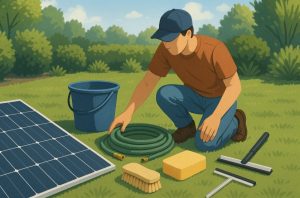
Before you begin cleaning your solar panels, having the right tools makes a significant difference. The equipment you use must be gentle yet effective to avoid scratching or damaging the surface. Whether you choose to clean them yourself or hire a professional, safe and proper tools are non-negotiable.
Tools Required (Bucket, Sponge, Squeegee, Hose)
| Tool | Purpose |
| Bucket | Holds water mixed with soap or vinegar |
| Soft sponge or brush | Gently lifts dirt without scratching the surface |
| Hose with spray nozzle | Rinses panels with low-pressure water |
| Squeegee | Removes excess water to prevent streaks |
| Extension pole (optional) | Helps reach panels safely from the ground |
DIY vs. Professional Equipment
If you opt for DIY, a basic set including a garden hose, a soft sponge or brush, and a squeegee is sufficient. These are cost-effective and easy to use for ground-level or slightly elevated panels.
Professional cleaners use more advanced tools, such as:
- Telescopic poles with integrated water feed
- Eco-friendly industrial cleaning solutions
- Soft rotating brushes for stubborn grime
These tools are particularly helpful for large or hard-to-reach installations.
Choosing the Right Soap or Cleaning Solution
Avoid harsh chemicals or abrasive cleaners, as they can damage the protective coating of the solar panels.
Instead, use:
- Mild dish soap mixed with lukewarm water
- Diluted white vinegar for greasy spots or bird droppings
- Biodegradable, solar-safe cleaners if available
Proper equipment selection not only ensures your safety but also protects your panels from potential damage.
How to Prepare Your Panels Before Cleaning?
Before you touch your solar panels, it’s essential to prepare them properly to avoid any risks and ensure a successful cleaning session. This preparation step safeguards both your panels and yourself.
Begin by turning off your solar panel system. This prevents any risk of electric shock and ensures that no electricity is being generated while you’re working.
Inspect the area for potential hazards:
- Look for any loose wiring or visible damage on the panels
- Check for bird nests or debris that might be blocking access
- Assess whether your panels are accessible from the ground or if you need special tools
Clear the surrounding space:
- Trim overhanging branches that may drop leaves during cleaning
- Ensure the ground is stable if you’ll be using a ladder or pole
- Move any garden furniture or equipment that may obstruct access
Gather all your cleaning materials and position them safely before starting. You want to avoid stepping away mid-process, especially when dealing with water near electrical systems.
Taking these precautions not only increases cleaning efficiency but also ensures your personal safety and preserves the structural integrity of the panels.
Step-by-Step Guide: How to Clean Solar Panels from the Ground?
Cleaning solar panels from the ground is the safest and often the most effective method for most homeowners. It removes the need to climb onto rooftops, which reduces the risk of injury and still delivers excellent results when done correctly.
Follow this method step by step:
Step 1: Rinse with a Hose
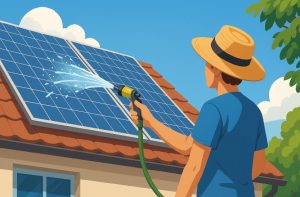
Start by spraying the panels with a gentle stream of water. This loosens dust, pollen, and light debris. Use a hose with a spray nozzle that produces a soft mist or shower effect. Avoid any high-pressure attachments, as they can damage seals or wiring.
Step 2: Apply Gentle Cleaning Solution
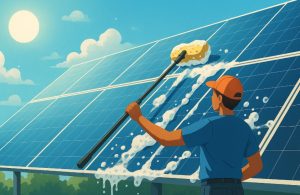
Mix a small amount of mild dish soap or white vinegar with lukewarm water in a bucket. Using a long-handled sponge or brush, apply the mixture to the surface of the panels. Focus on areas with visible bird droppings or sap, which can block sunlight.
Step 3: Use a Soft Brush or Sponge
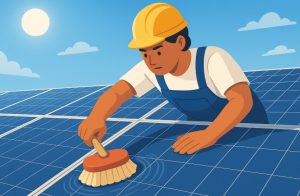
Gently scrub in circular motions without applying too much pressure. A soft-bristled brush or sponge ensures that you remove dirt without scratching the glass or its coating. Take care around the edges and any exposed connectors.
Step 4: Rinse Again
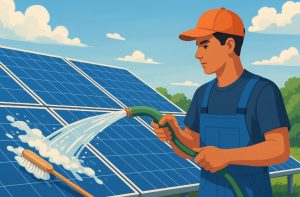
Once scrubbing is complete, rinse the panels thoroughly using the hose again. Make sure to remove all soap residue, as leftover solution can leave streaks or attract dust.
Step 5: Use a Squeegee to Dry
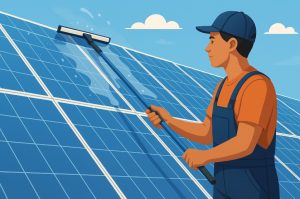
Using a soft rubber squeegee, remove excess water from the panels to prevent water spots. A squeegee with an extension handle is ideal for reaching across larger panels without stepping on anything unstable.
Step 6: Let Them Air Dry
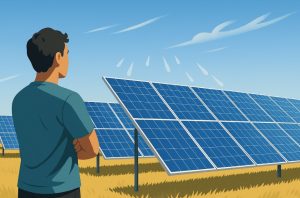
After using the squeegee, allow the panels to fully dry naturally. The sun will finish the job, especially if there’s a light breeze. Avoid touching the panels during this time to prevent new smudges.
By following this method, you ensure that your panels stay clean without risking damage or personal safety.
Can You Clean Solar Panels on the Roof Yourself?
While cleaning your panels might seem like a task you can handle on your own, rooftop solar panels present specific challenges. Safety should be your primary concern before attempting any rooftop work.
The key dangers include:
- Slippery surfaces, especially after applying water
- Risk of falling from heights without proper harnesses or training
- Accidental damage from walking on or applying pressure to panels
Even when panels are reachable, it’s best to stay grounded. Use telescopic poles or professional-grade tools that allow you to clean effectively from below.
If rooftop access is necessary, consider:
- Hiring trained professionals with the right equipment
- Using safety gear such as harnesses and non-slip footwear
- Never standing directly on the panels or their frames
Unless you’re fully equipped and experienced with working at heights, it’s safer and often more cost-effective to leave rooftop panel cleaning to the experts.
Common Mistakes to Avoid When Cleaning Solar Panels
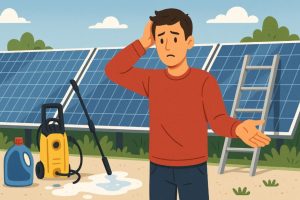
Cleaning solar panels may sound straightforward, but several common mistakes can harm their efficiency or even cause damage. Avoiding these pitfalls ensures a safer and more effective cleaning routine.
Some of the most frequent errors include:
- Using high-pressure washers: This can damage seals and connections
- Cleaning in direct sunlight: This leads to streaks and spots as water dries too fast
- Scrubbing too hard: Over-scrubbing can scratch the surface and reduce panel life
- Using harsh or abrasive cleaners: These degrade the panel coating over time
- Walking on panels: They’re not designed to bear weight and can crack or break
Other oversights include ignoring manufacturer instructions or skipping the pre-cleaning inspection step. Always read your system’s manual or consult the installer if unsure. Avoiding these simple but critical mistakes will extend the life of your solar panels and maintain their optimal performance year-round.
Should You Hire a Professional Solar Panel Cleaner?
In some cases, hiring a professional cleaner may be the most practical and safest option. This is especially true if your panels are installed on a steep roof, or if you’re uncomfortable handling equipment or working at height.
Professional cleaners come equipped with specialised tools, biodegradable cleaning agents, and safety gear. They know how to spot early signs of wear or damage and can clean thoroughly without risk to your equipment or themselves.
The cost of professional cleaning in the UK typically ranges from £20 to £20,0, depending on the size, location, and access of your installation.
It’s a worthwhile investment if you’re unsure about DIY methods or if your panels haven’t been cleaned for several years. Choosing professional services ensures peace of mind, reduces risk, and guarantees your panels are working efficiently.
How Often Should You Clean Solar Panels in the UK?
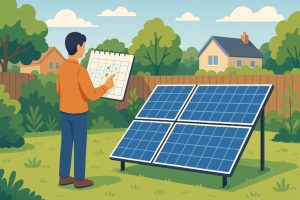
In the UK, most homeowners benefit from cleaning their solar panels twice a year, once in the spring and again in the autumn. This schedule helps clear away seasonal dirt buildup, including pollen in spring and dust or leaves in autumn.
However, the ideal frequency can vary depending on:
- Your location (rural, urban, coastal or industrial)
- Weather conditions (frequent rain vs dry spells)
- Proximity to trees, birds, or construction zones
Rain does help rinse some dirt off, but it doesn’t clean sticky substances like bird droppings or tree sap. If you live in a dry area or have ground-mounted panels that collect dust more easily, quarterly cleaning may be more suitable.
Keep a close eye on your energy output. If you notice a drop in performance, it might be time to give your panels a clean even if it hasn’t been long since the last one.
Solar Panel Cleaning and Maintenance Checklist
Maintaining your solar panels doesn’t stop at cleaning. Regular inspections and upkeep ensure they last longer and operate efficiently.
Use the following checklist to stay on top of your panel care:
| Task | Frequency | Description |
| Basic Cleaning | Twice yearly | Spring and autumn cleaning to remove seasonal buildup |
| Visual Inspection | Every 12 months | Check for cracks, loose wiring or shading issues |
| Post-Storm Check | After major storms | Look for branches, bird nests or debris |
| Professional Inspection | Every 3–5 years | Full service to check inverters and system efficiency |
| Inverter Check | Every 5–10 years | Replace if necessary to maintain system function |
| Warranty Review | Annually | Ensure you meet any maintenance conditions required by your installer |
Following this schedule keeps your panels in peak condition while preventing minor issues from turning into major problems.
Conclusion
Cleaning your solar panels doesn’t have to be complicated or dangerous. With the right tools, timing, and approach, you can keep them in excellent condition from the safety of the ground. Clean panels produce more energy, save you more money, and help extend the lifespan of your entire system.
Whether you choose the DIY route or hire a professional, consistency is key. Make panel maintenance part of your home care routine and enjoy the full benefits of your solar investment year after year.
FAQs
How do I know if my solar panels need cleaning?
If you notice a drop in energy output or see visible dirt buildup, it’s time to clean them.
Can I use tap water to clean my panels?
Yes, but if your water is hard, use filtered or rainwater to avoid mineral deposits.
What’s the safest way to clean hard-to-reach panels?
Use a telescopic pole from the ground or hire a professional for rooftop systems.
Can dirty panels void my warranty?
In some cases, warranties require basic maintenance like cleaning to remain valid.
How much sunlight do dirty panels lose?
Dirty panels can lose up to 20 percent of their potential energy output.
Is rain enough to clean solar panels in the UK?
Rain helps rinse dust, but it won’t remove grime, droppings, or sticky residue.
Can I clean solar panels with a power washer?
No, high pressure can damage seals and wiring, use a low-pressure hose instead.

